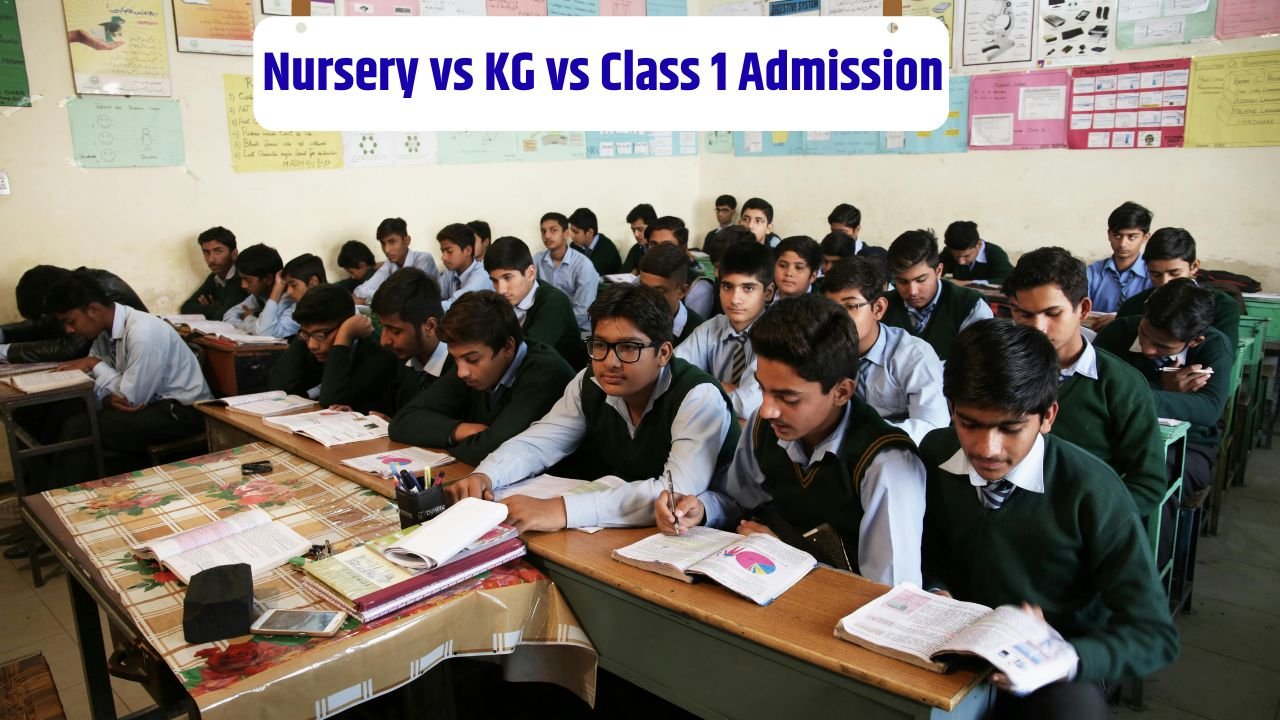Getting your child admitted to Agarwal International School in Vidisha can feel overwhelming. After speaking with dozens of parents who’ve been through this process—both successfully and unsuccessfully—I’ve identified the most common pitfalls that can derail your admission hopes. This comprehensive guide will help you navigate the process smoothly and increase your chances of securing that coveted seat.
Why These Mistakes Matter
Agarwal International Vidisha receives over 800 applications annually for just 120 available seats across all grades. With such intense competition, even small oversights can result in rejection. The admission committee reviews applications meticulously, and parents who avoid these common errors significantly improve their chances of acceptance.
Quick Statistics:
- Application to admission ratio: 6.7:1
- Most competitive grades: Nursery, KG, Grade 6, and Grade 9
- Average processing time: 45-60 days
- Interview success rate: 35%
The Top 10 Critical Mistakes
1. Missing the Application Deadline Rush
The Mistake: Many parents assume they can submit applications casually or wait until the last minute.
Why It Happens: Agarwal International opens admissions in November, but parents often delay thinking they have plenty of time. The December holidays create a false sense of extended deadlines.
Real Impact: Late applications face several disadvantages:
- Limited seat availability in preferred sections
- Rushed document preparation leading to errors
- Missed early bird interview slots
- Higher stress levels affecting family dynamics
The Solution: Mark these crucial dates in your calendar:
- Application opens: November 1st
- Early submission benefit: November 30th
- Final deadline: January 15th
- Late applications (if seats available): February 28th
Parent Experience: Meera Sharma from Vidisha shares, “I submitted my daughter’s application on January 10th thinking I was well within the deadline. Later I learned that families who applied in November got priority interview dates and better chances at their preferred section timings.”
2. Incomplete or Incorrect Documentation
The Mistake: Submitting applications with missing documents, wrong formats, or outdated information.
Common Documentation Errors:
- Birth certificates without proper attestation
- Academic records missing school seal
- Address proof older than 3 months
- Income certificates without proper classification
- Medical records lacking required vaccinations
- Transfer certificates with discrepancies
Why Schools Reject Applications: The admission team at Agarwal International follows strict verification protocols. Incomplete applications create administrative delays and often result in automatic rejection during the first screening round.
The Solution: Create a document verification checklist:
- ✅ Original + 3 photocopies of each document
- ✅ Proper attestation from authorized officials
- ✅ Recent photographs (taken within 6 months)
- ✅ All forms filled in blue ink (not black or pencil)
- ✅ Parent signatures match across all documents
- ✅ Contact information is current and accurate
Admission Officer Insight: “We receive applications with student photos from 2-3 years ago, or forms filled with different pen colors. These seem minor, but they indicate carelessness that makes us question parent commitment.”
3. Ignoring the School’s Educational Philosophy
The Mistake: Applying without understanding what Agarwal International stands for educationally and culturally.
What Parents Miss:
- The school’s emphasis on holistic development
- Their unique STEM-integrated curriculum approach
- Community service requirements
- Language learning expectations (English, Hindi, plus one foreign language)
- Sports and arts mandatory participation
Interview Consequences: During parent interviews, admission committees specifically ask about alignment with school values. Parents who can’t articulate why Agarwal International fits their child’s needs often face rejection.
Research Areas to Focus On:
- School’s mission and vision statements
- Recent achievements and awards
- Teaching methodology and curriculum structure
- Extra-curricular programs and expectations
- Alumni success stories and career paths
- School’s approach to technology integration
Success Story: Rajesh Patel researched the school’s robotics program extensively before his interview. “When they asked why we chose Agarwal International, I could specifically mention how their STEM lab would benefit my son’s interest in coding. They were impressed by my detailed knowledge.”
4. Poor Interview Preparation
The Mistake: Treating the parent-student interview casually or focusing only on academics.
What Admission Committees Actually Evaluate:
- Family’s genuine interest in the school community
- Child’s social and emotional readiness
- Parent’s realistic expectations about their child
- Family’s ability to support school initiatives
- Communication skills and cultural fit
Common Interview Mistakes:
- Parents answering questions meant for the child
- Criticizing the child’s current school negatively
- Unrealistic expectations about academic outcomes
- Lack of preparation for basic questions
- Inappropriate dress or behavior during the interview
Interview Preparation Strategy:
For Parents:
- Practice explaining your child’s strengths and areas for growth
- Prepare specific questions about school programs
- Research current school events and initiatives
- Plan your responses to common questions about discipline and homework
For Students:
- Practice basic conversations in English
- Prepare to talk about hobbies and interests
- Review basic academic concepts for their grade level
- Practice good manners and social interaction
Typical Interview Questions:
- “Why do you want to join Agarwal International?”
- “How do you handle your child’s challenging behavior?”
- “What are your expectations from our school?”
- “How will you support school activities and events?”
5. Overlooking the Entrance Assessment Requirements
The Mistake: Underestimating the entrance test or not preparing the child adequately.
Assessment Components by Grade:
Nursery to KG:
- Basic motor skills observation
- Social interaction assessment
- Simple cognitive tasks
- Following instructions ability
Grades 1-5:
- English comprehension and vocabulary
- Mathematics problem-solving
- General awareness
- Creative expression tasks
Grades 6-12:
- Subject-specific knowledge tests
- Analytical thinking exercises
- English proficiency examination
- Mathematics aptitude test
- Science reasoning (for higher grades)
Preparation Timeline:
- 3 months before: Start regular practice sessions
- 2 months before: Focus on weak areas
- 1 month before: Take practice tests
- 1 week before: Review and relax
Parent Guidance: Don’t over-coach your child. The school wants to assess natural ability and potential, not cramming results. Focus on building confidence rather than perfect answers.
6. Financial Planning Oversights
The Mistake: Not budgeting for the complete cost of education at Agarwal International.
Hidden Costs Parents Often Miss:
Beyond Tuition Fees:
- Admission processing fee: ₹2,500 (non-refundable)
- Security deposit: ₹15,000 (refundable)
- Uniform and books: ₹8,000-12,000 annually
- Transportation: ₹18,000-25,000 per year
- Activity fees: ₹5,000-8,000 per semester
- Exam fees: ₹1,500-3,000 per year
- Field trips and excursions: ₹10,000-15,000
- Technology fee: ₹3,000-5,000 annually
Annual Budget Planning:
- Grade 1-5: ₹85,000-1,20,000
- Grade 6-8: ₹95,000-1,35,000
- Grade 9-12: ₹1,10,000-1,50,000
Financial Aid Options:
- Merit scholarships (10-25% fee reduction)
- Need-based assistance (case-by-case evaluation)
- Sibling discount (15% for second child)
- Early payment discounts (5-8% if paid annually)
7. Not Building School Community Connections
The Mistake: Applying without any connection to or understanding of the school community.
Why Connections Matter: Schools like Agarwal International value community building. Families who show genuine interest in contributing to school culture often receive preference during admission decisions.
Ways to Build Connections:
- Attend school open houses and information sessions
- Participate in school-organized community events
- Connect with current parent groups on social media
- Volunteer for school fundraising or cultural programs
- Engage with school alumni networks
Community Engagement Benefits:
- Better understanding of school expectations
- Insider knowledge about admission process
- References from current families
- Demonstrated commitment to school values
- Network support for your child’s transition
Real Example: The Kumar family attended three school events before applying. During their interview, they could reference specific programs they’d witnessed and express genuine enthusiasm for contributing to the school’s annual cultural fest.
8. Misunderstanding the Waitlist Process
The Mistake: Giving up hope after being placed on the waitlist or not maintaining active interest.
How Agarwal International’s Waitlist Works:
- Primary list: Top candidates (offer letters sent immediately)
- Waitlist tier 1: Strong candidates (contacted within 2-4 weeks)
- Waitlist tier 2: Potential candidates (contacted based on availability)
- Extended waitlist: Considered for next academic year
Staying Active on Waitlist:
- Send monthly updates about your child’s achievements
- Maintain contact with admission office (not daily, but regularly)
- Express continued strong interest through proper channels
- Provide any new relevant information or documentation
- Consider reapplying with stronger application next year
Waitlist Success Stories: About 15-20% of waitlisted candidates eventually receive admission offers. Families who remain positively engaged and show continued interest have the highest success rates.
9. Ignoring Age and Grade Placement Guidelines
The Mistake: Applying for the wrong grade level or not understanding age cutoff requirements.
Agarwal International Age Guidelines:
- Nursery: 3 years by March 31st
- KG: 4 years by March 31st
- Grade 1: 5 years by March 31st
- Grade 2 and above: Previous grade completion certificate required
Common Placement Issues:
- Parents requesting grade skipping without proper assessment
- Age cutoff confusion leading to wrong applications
- Transfer students missing prerequisite subjects
- International students needing curriculum alignment
- Special needs students requiring additional documentation
Grade Placement Assessment: The school conducts comprehensive evaluations for students requesting non-standard placement. This includes academic testing, psychological assessment, and consultation with previous school counselors.
10. Inadequate Follow-up and Communication
The Mistake: Poor communication with the admission office throughout the process.
Communication Best Practices:
- Respond promptly to all school communication
- Use official email addresses provided by the school
- Follow up appropriately without being pushy
- Provide requested information within specified deadlines
- Maintain professional tone in all interactions
Red Flags in Communication:
- Calling multiple times daily for status updates
- Using inappropriate channels (personal contacts, social media)
- Making demands rather than requests
- Providing conflicting information in different communications
- Failing to acknowledge receipt of important documents
Effective Follow-up Timeline:
- Initial application: Confirmation within 48 hours
- Missing documents: Submission within 1 week
- Interview scheduling: Response within 3 days
- Additional information requests: Provide within timeline given
- Status inquiries: Monthly check-ins are appropriate
Parent Success Stories
Case Study 1: The Prepared Family
Background: The Agrawal family from Vidisha applied for Grade 3 admission in 2024.
Their Strategy:
- Started research in October, applied on November 15th
- Attended two school events before applying
- Prepared their son with age-appropriate practice sessions
- Had all documents ready with proper attestation
- Practiced interview questions as a family
Outcome: Accepted with merit scholarship and preferred morning section placement.
Key Takeaway: “Preparation and genuine interest made the difference. We weren’t just applying to a school; we were joining a community.” – Mrs. Agrawal
Case Study 2: The Comeback Story
Background: The Mishra family was initially rejected for Grade 6 admission.
What Went Wrong:
- Late application submission
- Incomplete medical records
- Child was unprepared for entrance assessment
- No research about school programs
Their Second Attempt:
- Applied early the following year
- Complete documentation with proper verification
- Enrolled child in preparatory classes
- Attended school cultural fest and sports day
- Demonstrated specific interest in school’s music program
Outcome: Successfully admitted with special recognition for musical talent.
Lesson Learned: “Rejection taught us to take the process seriously. The second time, we approached it like the important decision it was.” – Mr. Mishra
Case Study 3: The Transfer Student Success
Background: The Patel family moved from Mumbai and needed Grade 9 admission mid-year.
Challenges:
- Different curriculum background (ICSE to CBSE transition)
- Limited seat availability
- No local connections
- Time pressure due to job transfer
Their Approach:
- Immediate contact with admission office upon arrival
- Provided comprehensive academic portfolio
- Arranged meeting with academic coordinator for curriculum alignment discussion
- Child took additional assessment for subject placement
- Parents committed to supporting transition through tutoring if needed
Result: Admitted with personalized academic support plan.
Success Factor: “Honesty about challenges and willingness to take extra steps showed our commitment.” – Mrs. Patel
School Admission Team Insights
Based on conversations with Agarwal International’s admission committee, here are insider perspectives on what makes applications successful:
What Admission Officers Look For
Academic Readiness: “We don’t expect perfection, but we look for children who are curious learners and parents who support educational growth.” – Ms. Priya Sharma, Admission Coordinator
Family Commitment: “Families who research our programs and ask thoughtful questions during interviews show they’re serious about being part of our community.” – Mr. Rakesh Verma, Principal
Child’s Potential: “We assess not just current ability but potential for growth. A child who shows enthusiasm and good social skills often succeeds more than one who’s academically advanced but not emotionally ready.” – Mrs. Sunita Jain, Academic Director
Common Red Flags
Unrealistic Expectations: “Parents who expect guaranteed top ranks or university admissions without understanding the work required usually don’t align with our holistic approach.” – Admission Team
Lack of Research: “When families can’t explain why they chose our school specifically, it suggests they’re applying everywhere without real interest.” – Interview Panel Member
Over-Coaching Children: “Children who give rehearsed answers rather than natural responses raise concerns about family pressure and child’s authentic personality.” – Child Psychologist on Admission Committee
Month-by-Month Admission Timeline
October
Parent Actions:
- Research school thoroughly (website, reviews, events)
- Attend school open house if available
- Start gathering required documents
- Begin child’s age-appropriate preparation
School Activities:
- Admission brochure release
- Information sessions for prospective parents
- Previous year’s admission analysis completion
November
Parent Actions:
- Submit application by November 30th for early consideration
- Complete document verification and attestation
- Register for entrance assessment
- Schedule school visit if possible
School Activities:
- Application portal opens November 1st
- First round of application screening begins
- Interview scheduling for early applicants
December
Parent Actions:
- Prepare for entrance assessments
- Practice interview questions with child
- Maintain contact with admission office for updates
- Attend school cultural programs if open to public
School Activities:
- Entrance assessments begin
- Parent-child interviews conducted
- Preliminary admission decisions for early applicants
January
Parent Actions:
- Final application submissions (deadline January 15th)
- Complete any pending documentation
- Follow up on application status appropriately
- Prepare backup school options
School Activities:
- Main round of entrance assessments
- Intensive interview schedules
- Academic coordinator meetings for special cases
February
Parent Actions:
- Await admission decisions
- Respond promptly to any school communications
- Maintain interest if placed on waitlist
- Plan for admission formalities if accepted
School Activities:
- Final admission decisions announced
- Waitlist management begins
- Admission formality scheduling
March-April
Parent Actions:
- Complete admission formalities within deadlines
- Pay required fees and submit security deposits
- Purchase uniforms and books
- Prepare child for new school transition
School Activities:
- Final seat confirmations
- Orientation program planning
- New student integration preparations
Document Checklist
Essential Documents for All Grades
Child’s Documents:
- [ ] Birth certificate (original + 3 photocopies)
- [ ] Previous school records/report cards (last 2 years)
- [ ] Transfer certificate (if applicable)
- [ ] Medical fitness certificate with vaccination records
- [ ] Recent passport-size photographs (6 copies)
- [ ] Aadhaar card copy
- [ ] Caste certificate (if applicable)
Parent Documents:
- [ ] Father’s ID proof (Aadhaar/Passport/Driving License)
- [ ] Mother’s ID proof (Aadhaar/Passport/Driving License)
- [ ] Income certificate (latest, within 6 months)
- [ ] Address proof (utility bill/rent agreement)
- [ ] Employment verification letters
- [ ] Bank account details and statements
Additional Documents (Grade-Specific):
- [ ] Portfolio of achievements (certificates, awards)
- [ ] Character certificate from previous school
- [ ] Migration certificate (for interstate transfers)
- [ ] Equivalence certificate (for international students)
- [ ] Special needs assessment reports (if applicable)
Document Verification Tips
Attestation Requirements:
- Educational documents: Attested by previous school principal
- Income certificates: Attested by competent authority
- Medical certificates: Attested by registered medical practitioner
- Address proofs: Self-attested copies acceptable
Common Mistakes to Avoid:
- Using black ink instead of blue for forms
- Photocopies without proper contrast
- Outdated photographs or certificates
- Missing signatures or dates
- Incorrect information across different documents
Frequently Asked Questions
When should we start the admission process?
Detailed Answer: Begin your preparation at least 6 months before the admission cycle. For Agarwal International Vidisha, serious preparation should start in October for applications opening in November. This timeline allows adequate research, document preparation, and child readiness without last-minute stress. Early preparation also provides opportunities to attend school events and build community connections.
Why This Timing Matters: The school’s admission committee appreciates families who demonstrate long-term interest rather than last-minute decisions. Early preparation also ensures you don’t miss critical deadlines or early-bird advantages.
What is the typical fee structure at Agarwal International Vidisha?
Comprehensive Breakdown:
Annual Tuition Fees (2024-25):
- Nursery to KG: ₹65,000 – ₹75,000
- Grades 1-5: ₹70,000 – ₹85,000
- Grades 6-8: ₹80,000 – ₹95,000
- Grades 9-10: ₹90,000 – ₹1,05,000
- Grades 11-12: ₹95,000 – ₹1,10,000
Additional Mandatory Costs:
- One-time admission fee: ₹15,000-25,000 (varies by grade)
- Annual activity fee: ₹8,000-12,000
- Books and uniforms: ₹10,000-15,000
- Transportation (optional): ₹20,000-30,000
- Technology fee: ₹4,000-6,000
Payment Options: The school offers quarterly, semi-annual, and annual payment plans. Annual payments typically receive 5-8% early payment discounts. EMI options are available through partnered financial institutions.
How competitive is the admission process?
Statistical Reality: Agarwal International receives approximately 800-1000 applications annually across all grades for about 120-150 available seats. This creates a competitive environment with admission rates varying by grade:
Most Competitive Grades:
- Nursery: 8-10 applications per seat
- KG: 7-9 applications per seat
- Grade 6: 6-8 applications per seat
- Grade 9: 5-7 applications per seat
Less Competitive Grades:
- Grades 2-4: 3-5 applications per seat
- Grades 7-8: 4-6 applications per seat
- Grades 11-12: 2-4 applications per seat
Success Factors: Academic readiness (40%), family alignment with school values (30%), interview performance (20%), and community connections (10%) influence admission decisions.
What should we do if our child is placed on the waitlist?
Strategic Waitlist Management:
Immediate Actions (First Week):
- Acknowledge waitlist placement professionally
- Reaffirm strong interest in the school
- Ask about your position on the waitlist (they may not share exact numbers)
- Inquire about factors that could improve your candidacy
Ongoing Strategy (Monthly):
- Send updates about child’s academic achievements
- Share relevant extracurricular accomplishments
- Maintain contact without being pushy (once monthly is appropriate)
- Consider visiting school events to demonstrate continued interest
Success Statistics: Approximately 15-25% of waitlisted candidates receive admission offers, typically between February and May. Families who maintain appropriate contact and show genuine interest have higher success rates.
Backup Planning: While maintaining hope, simultaneously pursue admission at other preferred schools to ensure your child has options.
Can we request a specific teacher or section?
School Policy: Agarwal International considers parent preferences but makes final decisions based on:
- Class size balance
- Academic grouping requirements
- Teacher-student ratio optimization
- Behavioral and learning compatibility
How to Make Requests:
- Mention preferences during the interview process
- Provide educational rationale (not personal preferences)
- Submit written requests with specific reasons
- Understand that final decisions rest with school administration
Success Tips: Focus on your child’s learning needs rather than personal preferences. For example, “Our child works better in smaller group settings” is more compelling than “We heard Mrs. X is the best teacher.”
What is the school’s approach to students with learning differences?
Inclusive Education Philosophy: Agarwal International maintains an inclusive approach while ensuring they can provide appropriate support for each child’s needs.
Support Services Available:
- Learning support coordinator on staff
- Individualized education plans (IEPs)
- Regular parent-teacher-counselor meetings
- Peer support programs
- Modified assessment methods when appropriate
Admission Process for Special Needs:
- Additional documentation required (psychological assessments, previous support records)
- Meeting with learning support team
- Trial period may be suggested
- Clear support plan developed before admission
Parent Responsibility: Families must provide complete disclosure of learning differences and be prepared to collaborate closely with school support teams.
How does the school handle transfers between academic boards?
Board Transfer Support: The school assists students transitioning between CBSE, ICSE, and State boards, but requires preparation and assessment.
Transfer Process:
- Academic transcript evaluation
- Subject alignment assessment
- Possible bridge courses for curriculum gaps
- Counselor meeting to discuss transition challenges
- Trial period for difficult transitions
Common Challenges:
- ICSE to CBSE: Adjustment to different teaching methodologies
- State Board to CBSE: Language of instruction adaptation
- International to Indian: Cultural and academic integration
Success Support: The school provides additional academic support during transition periods but expects family commitment to help with adjustment.
What extracurricular activities are mandatory vs. optional?
Mandatory Participation:
- Physical education (all grades)
- Cultural program participation (annual function)
- Community service projects (grades 6-12)
- House activities and competitions
- Library and reading programs
Optional but Encouraged:
- Sports teams (cricket, basketball, swimming)
- Music and dance classes
- Drama and theater groups
- Science and robotics clubs
- Debate and quiz competitions
- Art and craft workshops
Benefits of Participation: Active participation in extracurriculars positively influences academic evaluations and leadership development opportunities within the school.
How does the school communicate with parents?
Communication Channels:
- Official school app for daily updates
- Monthly newsletter via email
- SMS alerts for urgent communications
- Parent-teacher meetings (scheduled quarterly)
- WhatsApp groups for class-specific updates
- School website portal for academic records
Response Expectations:
- School responds to parent queries within 24-48 hours
- Emergency communications receive immediate attention
- Academic concerns addressed through proper counselor channels
- Administrative issues handled by respective department heads
Parent Communication Guidelines:
- Use official channels for school-related communications
- Avoid directly contacting teachers on personal numbers
- Schedule appointments for detailed discussions
- Follow school’s communication protocol for complaints or suggestions
What happens if we need to withdraw our child mid-year?
Withdrawal Process:
- Submit written application one month in advance
- Clear all pending dues and fees
- Return school property (books, uniforms, ID cards)
- Complete exit formalities with all departments
- Obtain transfer certificate and academic records
Financial Implications:
- Tuition fees paid in advance are generally non-refundable
- Security deposits refunded after deducting any damages
- Activity fees may be prorated based on participation
- Transportation fees calculated till last day of attendance
Re-admission Policy: Students who withdraw can reapply for future academic years but must go through the complete admission process again without any preferential treatment.
Expert Tips for Success
From Educational Consultants
Tip 1: Authenticity Over Perfection “Schools can identify over-coached children easily. Let your child’s natural personality shine through during interactions. Authentic curiosity and genuine interest are more valuable than rehearsed perfection.” – Dr. Meera Agarwal, Educational Consultant
Tip 2: Long-term Vision “Don’t choose a school based solely on academic reputation. Consider whether the school’s values align with your family’s long-term goals for character development and life skills.” – Prof. Rajesh Kumar, Child Development Expert
Tip 3: Community Integration “Successful school experiences depend on family integration into the school community. Start building relationships even before admission confirmation.” – Mrs. Sunita Verma, Parent Counselor
From Current Parents
Financial Planning Wisdom: “Budget for 20% more than the stated fees. Unexpected expenses like educational trips, additional coaching, or emergency fees can add up quickly.” – Parent of Grade 7 student
Interview Preparation: “Practice having your child explain their interests naturally. Schools want to see personality, not performance. Our daughter talked about her love for drawing, and it led to a wonderful conversation about creativity.” – Parent of Grade 3 student
Documentation Organization: “Create a master file with all documents, both physical and digital copies. The admission process involves multiple submissions, and being organized saves time and stress.” – Parent of Grade 5 student
From School Counselors
Child Readiness Assessment: “Evaluate your child’s emotional and social readiness, not just academic preparedness. A child who can adapt to new environments and make friends easily often succeeds more than one who’s academically advanced but socially anxious.” – School Counselor
Parent Expectation Management: “Be realistic about your child’s capabilities and growth trajectory. Schools appreciate parents who see their children clearly and support their individual journey rather than imposing unrealistic expectations.” – Academic Advisor
Conclusion: Your Path to Admission Success
Successfully navigating admission to Agarwal International Vidisha requires careful planning, genuine preparation, and realistic expectations. The families who succeed are those who view this process not as a transaction but as the beginning of a long-term educational partnership.
Remember that rejection doesn’t reflect your child’s worth or potential—sometimes it’s simply about fit and timing. Many successful students have thrived after initially being denied admission to their first-choice schools.
Key Success Principles:
- Start early and plan thoroughly
- Research deeply and engage authentically
- Prepare your child appropriately without over-coaching
- Maintain realistic expectations while staying optimistic
- View the process as a family learning experience
Final Advice: Whether your application succeeds or not, the preparation process itself is valuable. The research skills, organization habits, and family discussions about educational values will benefit you regardless of the outcome.
Your child’s educational journey is much more than any single school admission. Focus on finding the right fit, and remember that success comes from the partnership between motivated students, supportive families, and committed educators—no matter which school ultimately becomes your child’s academic home.
Take Action Today: If you’re planning to apply for the next admission cycle, start with step one: thoroughly researching whether Agarwal International’s educational philosophy truly aligns with your family’s values and your child’s needs. This foundation will guide every other decision in your admission journey.
Have you started your admission preparation? Share your experiences or questions in the comments below to help other parents navigate this important process.
















